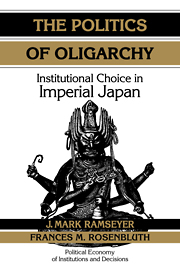Book contents
- Frontmatter
- Contents
- List of tables and figure
- Series editors' preface
- Acknowledgments
- CHAPTER 1 INTRODUCTION
- CHAPTER 2 THE COLLAPSE OF OLIGARCHY: FAILED ATTEMPTS AT CARTEL-MAINTENANCE
- CHAPTER 3 CONCESSION OR FACADE: THE MEIJI CONSTITUTION
- CHAPTER 4 ELECTORAL RULES AND PARTY COMPETITION: THE STRUGGLE FOR POLITICAL SURVIVAL
- CHAPTER 5 THE BUREAUCRACY: WHO RULED WHOM?
- CHAPTER 6 THE COURTS: WHO MONITORED WHOM?
- CHAPTER 7 THE MILITARY: MASTER OF ITS OWN FATE
- CHAPTER 8 FINANCIAL POLITICS
- CHAPTER 9 RAILROAD POLITICS
- CHAPTER 10 COTTON POLITICS
- CHAPTER 11 CONCLUSION: INSTITUTIONS AND POLITICAL CONTROL
- Notes
- References
- Index
CHAPTER 2 - THE COLLAPSE OF OLIGARCHY: FAILED ATTEMPTS AT CARTEL-MAINTENANCE
Published online by Cambridge University Press: 05 June 2012
- Frontmatter
- Contents
- List of tables and figure
- Series editors' preface
- Acknowledgments
- CHAPTER 1 INTRODUCTION
- CHAPTER 2 THE COLLAPSE OF OLIGARCHY: FAILED ATTEMPTS AT CARTEL-MAINTENANCE
- CHAPTER 3 CONCESSION OR FACADE: THE MEIJI CONSTITUTION
- CHAPTER 4 ELECTORAL RULES AND PARTY COMPETITION: THE STRUGGLE FOR POLITICAL SURVIVAL
- CHAPTER 5 THE BUREAUCRACY: WHO RULED WHOM?
- CHAPTER 6 THE COURTS: WHO MONITORED WHOM?
- CHAPTER 7 THE MILITARY: MASTER OF ITS OWN FATE
- CHAPTER 8 FINANCIAL POLITICS
- CHAPTER 9 RAILROAD POLITICS
- CHAPTER 10 COTTON POLITICS
- CHAPTER 11 CONCLUSION: INSTITUTIONS AND POLITICAL CONTROL
- Notes
- References
- Index
Summary
INTRODUCTION
“Revere the emperor, throw out the barbarians” and “Rich country, strong army” were their refrains. But a more fundamental concern of the Meiji oligarchs – and a more self-serving one than they cared to advertise in their rhetoric – was to avoid the fate they had visited upon the Tokugawa family in 1868. As with all political leaders, the oligarchs had first to remain in office before they could achieve any other goals they might have had – whether those were increasing their own wealth or that of their countrymen or anything else.
The Meiji oligarchs ultimately failed to retain the monopoly grip on power they had collectively won; but their loss was not for lack of trying. This chapter recounts the rounds of internal bargaining and institutional adjustments among the oligarchs between 1868 and 1881. There was a palpable tension throughout the period: On the one hand, the oligarchs knew they had to cooperate to protect their regime. On the other hand, each oligarch struggled to rise above his fellow oligarchs. The result was a continuing pattern of alliance-shifting and coalition-building. Some oligarchs – Okuma Shigenobu, Itagaki Taisuke, and later Itō Hirobumi – eventually threw in their lots with the political parties to boost their relative power within the oligarchy. It was this jockeying for power among themselves and bringing in support from outside the circle that destroyed the oligarchy's exclusive control of Japan's political system.
- Type
- Chapter
- Information
- The Politics of OligarchyInstitutional Choice in Imperial Japan, pp. 15 - 28Publisher: Cambridge University PressPrint publication year: 1995



